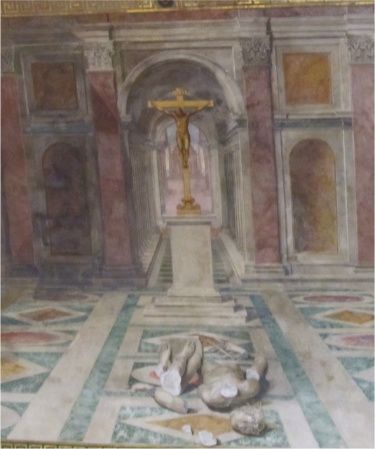
The English writer and mystic Caryll Houselander is one of those people whose work I keep meaning to read, because every time I am exposed to even a little of her thinking, I’m intrigued and want more — she always puts me a bit in mind of Heather King.
At the Philanthropy Daily blog, Scott Walter serves up a dose of Houselander that packs a relevant wallop:
Pope Francis’ election reminded me of a passage in Houselander’s letters.
She’s writing to a Mr. St. George about [a man whose tragic life caused him to lose faith and disappear. After a deep encounter with the poor he] arrived at the great truth of the presence of Christ in man. Whatever is loving and whatever is lovable, he thought, is Christ in man. This idea changed his whole life…He has resumed his life among his fellow beings, but very often he returns to the doss-houses to try and give to others some of the faith and kindness they gave to him.
“All that and much more is what I mean by the unconscious Christ in man; and to me it is the unconscious Christ which is the consolation for the unlovingness of the professionally righteous.”
Houselander concludes that the usual “efforts at reform” in the Church are useless.
“There are only two weapons against the worldly spirit which has possessed so many Catholics for so long,” and they are “Contemplation and visible, voluntary Poverty.”
How prophetic, given that Rome now has a Pope Emeritus devoted to the former and a new Pope devoted to the latter. Pope Benedict voluntarily gave away his power to devote himself to a cloistered life of contemplation. And Pope Francis famously said after his election, “How I would like a Church which is poor and for the poor.”
Well, alrighty, then, by Houselander’s measure it sounds like — thanks to Benedict’s willingness to exchange power for prayer and thus make room for the perfect movement of the Holy Spirit — we are on the right track.
But something tells me that we’re in for a wild ride, that lots of surprising things are going to happen very quickly, and that for a while things will seem dizzyingly off-kilter before it all comes aright.
We keep talking about the Barque of Peter, tossed by the perfect, ongoing storm of scandal, material excess, social decay and self-interest that has kept us whirling in a maelstrom. You don’t simply spin a wheel and steady the ship. If it were that easy, it would already be done. We’re in for some very challenging times as this Barque sees some sails raised, others lowered.
I can’t help but think of Don Bosco’s vision of the ship steered between two columns, one emphasizing the Virgin and the other emphasizing the Eucharist. I am not much for visions but it is not difficult to imagine the very Marian pope, Blessed John Paul II and the very Eucharistically-minded Benedict as the columns. Francis has already shown us that he is profoundly Marian and deeply Eucharistic:
The vision of Don Bosco continues: Meanwhile, enemy cannons blow up, firearms and beaks fall to pieces, ships crack up and sink to the bottom. In blind fury the enemy takes to hand-to-hand combat, cursing and blaspheming. Suddenly the Pope falls, seriously wounded, He is instantly helped up, but, struck down a second time, dies. A shout of victory rises from the enemy and wild rejoicing sweeps their ships. But no sooner is the Pope dead than another takes his place. The captains of the auxiliary ships elected him so quickly that the news of the Pope’s death coincides with that of his successor’s election. The enemy’s self-assurance waned.
Breaking through all resistance, the new Pope steers the ship safely between the two columns and moors it to the two columns; first, to the one surmounted by the Host and then to the other, topped by the statue of the Virgin.
At this point in the vision of Don Bosco, something unexpected happens. The enemy ships panic and disperse, colliding with and scuttling each other.
Emphasis mine. Kind of interesting, yes?
Meanwhile, over at Get Religion, Terry takes a look what the world expects of church reform, which is probably different from what Rome has in mind. What a remarkable sort of mindset it takes to essentially say, “when the church stops being all that she is and has ever been, and becomes all that I am and think, then I will be happy to rejoin her, although — having utterly overturned itself to suit the age — what I finally deign to ‘rejoin’ will no longer exist.”
Successful idolatry does require an amount of cognitive dissonance, at which we humans tend to excel.
Related:
Don Bosco’s Legacy of Caring











